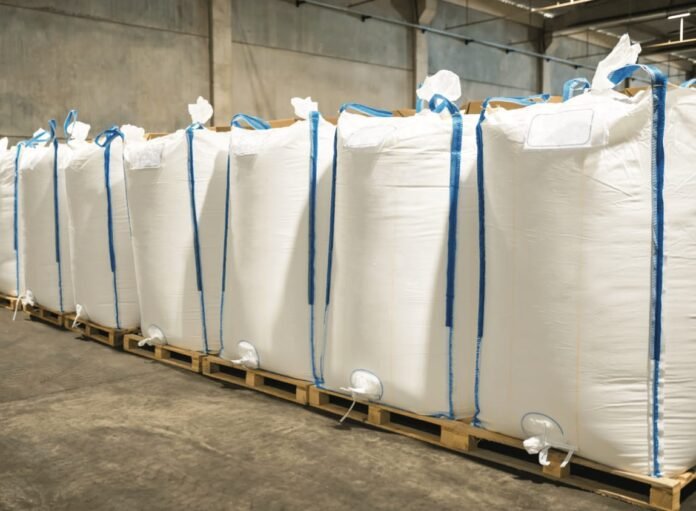FIBC bulk bags, known for their strength and versatility, have become a cornerstone in the packaging and transportation of bulk materials. In this comprehensive guide, we’ll walk you through the entire manufacturing process of FIBC bulk bags, demonstrating why we stand out as one of the leading bulk bag manufacturers.
1. Design and Specification
Our journey begins with the meticulous design and specification process. As FIBC bulk bag manufacturers, we engage closely with clients to understand their needs, focusing on aspects like use, capacity, dimensions, and features. This phase encompasses load capacity, filling and discharging mechanisms, lifting options, and safety considerations, tailoring each bag to its intended purpose.
2. Material Selection
The next crucial step is selecting the right material. We primarily use woven polypropylene or polyethylene fabrics, praised for their tensile strength, tear resistance, and UV stability. The material grade and thickness are chosen based on the application and environmental conditions, ensuring the durability and safety of the bags.
3. Fabric Weaving
In this stage, the chosen fabric is woven to precise dimensions. The weaving process involves interlacing warp and weft yarns on specialized looms, creating a robust fabric structure. The weave pattern varies, ranging from standard plain to complex circular weaves, tailored to each bag’s use and load requirements.
4. Cutting and Sewing
After weaving, the fabric is cut and sewn into panels. High-strength sewing machines perform this task, employing specialized stitching patterns for maximum durability. Additional reinforcements at stress points further enhance the strength of these large bulk bags.
5. Lifting Loops and Filling/Discharging Mechanisms
Lifting loops are attached during the sewing process, crafted from the same fabric or heavy-duty webbing. These loops facilitate easy transportation using forklifts or cranes. Depending on the bag’s design, various filling and discharging mechanisms are incorporated to streamline material handling.
6. Printing and Labeling
Customization is a key offering. As FIBC jumbo bag manufacturers, we provide options for printing logos, labels, safety instructions, and barcodes, ensuring clear and lasting markings.
7. Quality Control and Testing
Stringent quality control is integral to our process. We conduct regular testing for tensile strength, seam integrity, UV resistance, and electrostatic properties, adhering to industry standards and ensuring compliance with customer specifications.
8. Packaging and Shipment
The final step involves careful inspection, folding, and packaging for shipment. The bags are stacked, baled, or palletized based on transportation needs, with proper labeling and documentation for traceability.
How FPS Executes FIBC Manufacturing
FPS, as a leader in the industry, has revolutionized bulk transportation and storage with its FIBC industrial packaging. Our bags, made from high-quality materials, are designed to withstand heavy loads and extreme conditions. We pride ourselves on our efficiency and global reach, providing innovative and reliable packaging solutions.
Impact of Plastic Tax on FIBC Bag Manufacturers
The introduction of global plastic taxes, like those in California and the U.K., has put a spotlight on the production of virgin plastic waste. For FIBC bulk bag manufacturers, this presents both a challenge and an opportunity. The tax in the UK, for instance, applies to plastic packaging with less than 30% recycled content. As a result, we are focused on process excellence, reducing energy and water consumption, and using renewable energy sources.
In conclusion, the production of FIBC bulk bags is a complex but rewarding process. By adhering to stringent manufacturing standards and embracing sustainability, we, as bulk bag suppliers, continue to provide efficient and environmentally friendly solutions for various industries. The future of FIBC manufacturing looks bright, with continuous innovation and adaptation to global environmental policies.
Impact on FIBC Bag Suppliers
The introduction of plastic taxes has significant implications for FIBC bag suppliers like us. These taxes, aimed at reducing plastic waste, bring both challenges and opportunities for our industry.
1. Tax Requirements
In regions where plastic taxes are in effect, packaging materials with less than a specified percentage of recycled plastic may be subject to taxation. Understanding and complying with these requirements is crucial for FIBC bag suppliers.
2. Sustainable Practices
To mitigate the impact of plastic taxes, we are embracing sustainable practices in our manufacturing processes. This includes using recycled materials, reducing energy consumption, and exploring eco-friendly alternatives.
3. Innovation
The evolving landscape of plastic taxes encourages us to innovate. We are continuously exploring new materials and designs that align with tax regulations while meeting the needs of our customers.
4. Client Education
As responsible FIBC bag suppliers, we also play a role in educating our clients about the implications of plastic taxes and assisting them in making informed choices regarding packaging materials.
Conclusion
In a world increasingly concerned about plastic waste, FIBC bag manufacturers and suppliers must adapt to changing regulations and consumer demands. By embracing sustainability, innovation, and compliance with plastic tax laws, we can continue to provide high-quality and eco-friendly packaging solutions to our clients.
